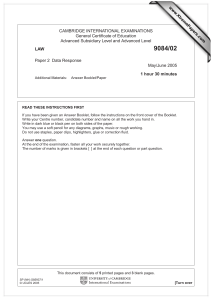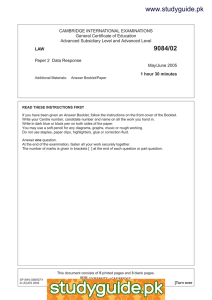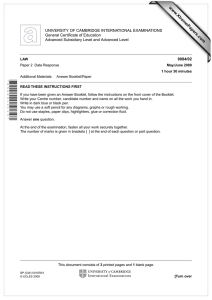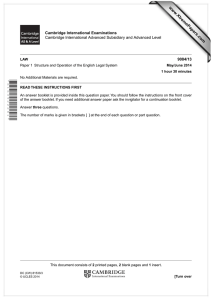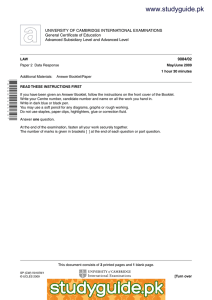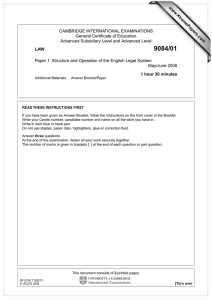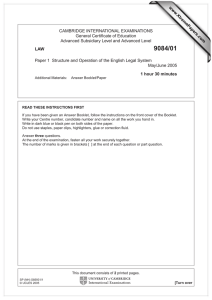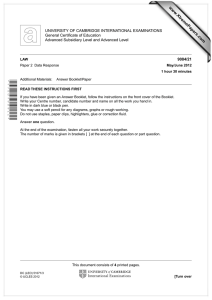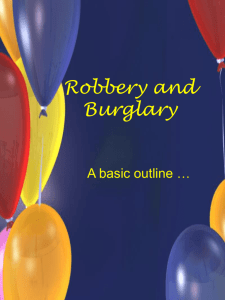www.XtremePapers.com Cambridge International Examinations 9084/22 Cambridge International Advanced Subsidiary and Advanced Level
advertisement
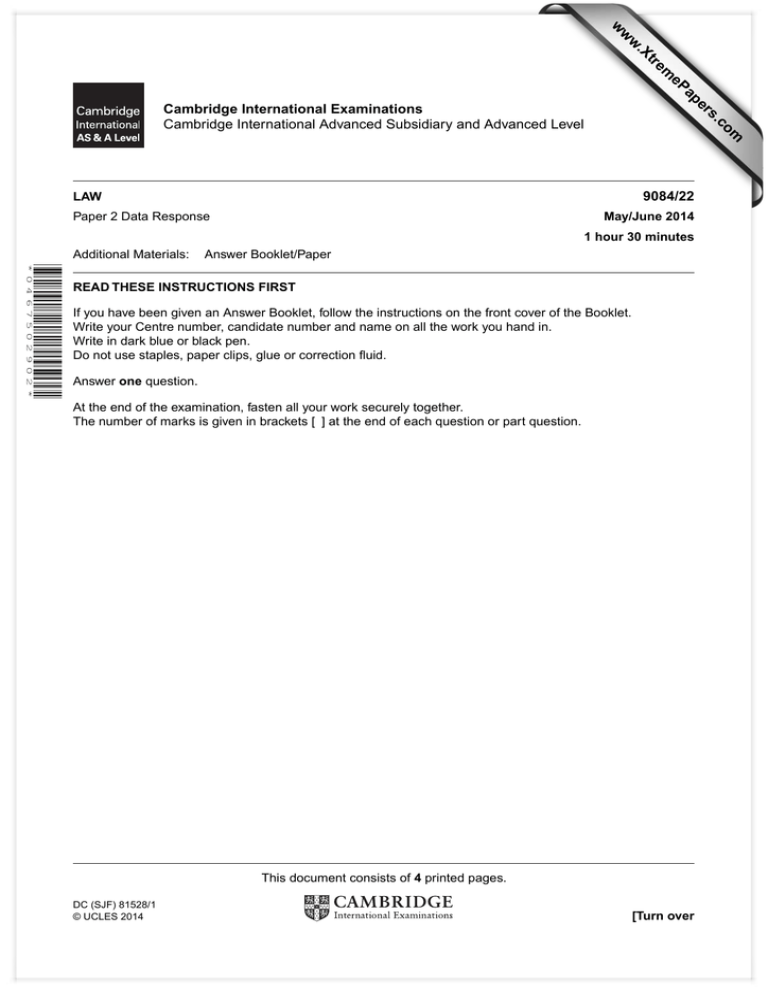
w w ap eP m e tr .X w om .c s er Cambridge International Examinations Cambridge International Advanced Subsidiary and Advanced Level 9084/22 LAW Paper 2 Data Response May/June 2014 1 hour 30 minutes Additional Materials: Answer Booklet/Paper * 0 4 6 7 5 0 2 9 0 2 * READ THESE INSTRUCTIONS FIRST If you have been given an Answer Booklet, follow the instructions on the front cover of the Booklet. Write your Centre number, candidate number and name on all the work you hand in. Write in dark blue or black pen. Do not use staples, paper clips, glue or correction fluid. Answer one question. At the end of the examination, fasten all your work securely together. The number of marks is given in brackets [ ] at the end of each question or part question. This document consists of 4 printed pages. DC (SJF) 81528/1 © UCLES 2014 [Turn over 2 Answer either Question 1 or Question 2. You should make appropriate reference to the source material supplied for each question. 1 Sykes asks Twist and Unwin to go with him at night to break in to a house owned by Lord Green. Sykes and Unwin break into the house and take some valuable jewellery. Twist stays outside as a lookout, armed with a cricket bat. Lord Green is awoken by the noise and comes down the stairs. Unwin produces an imitation gun from his coat pocket and threatens Lord Green with it. Twist sees a police car approach and shouts for Sykes and Unwin to leave. Sykes, Twist and Unwin are arrested by the police and taken to the police station for questioning. (a) Consider what offence, if any, Sykes has committed under the Theft Act 1968. [10] (b) Consider what offence, if any, Twist has committed under the Theft Act 1968. [10] (c) Consider what offence, if any, Unwin has committed under the Theft Act 1968. [10] (d) What protection is given to suspects when arrested by the police and taken to the police station for questioning? Discuss whether these measures provide adequate protection for those arrested by the police. [20] © UCLES 2014 9084/22/M/J/14 3 Source Material Theft Act 1968 s.9 (1) A person is guilty of burglary if— (a) he enters any building or part of a building as a trespasser and with intent to commit any such offence as is mentioned in subsection (2) below; or (b) having entered any building or part of a building as a trespasser he steals or attempts to steal anything in the building or that part of it or inflicts or attempts to inflict on any person therein any grievous bodily harm. (2) The offences referred to in subsection (1) (a) above are offences of stealing anything in the building or part of a building in question, of inflicting on any person therein any grievous bodily harm … therein, and of doing unlawful damage to the building or anything therein… s.10— Aggravated burglary (1) A person is guilty of aggravated burglary if he commits any burglary and at the time has with him any firearm or imitation firearm, any weapon of offence, or any explosive; and for this purpose— (a) “firearm” includes an airgun or air pistol, and “imitation firearm” means anything which has the appearance of being a firearm, whether capable of being discharged or not; and (b) “weapon of offence” means any article made or adapted for use for causing injury to or incapacitating a person, or intended by the person having it with him for such use; and (c) “explosive” means any article manufactured for the purpose of producing a practical effect by explosion, or intended by the person having it with him for that purpose. R. v Wiggins (Zaro Pierre) [2012] EWCA Crim 885 The appellant (W) appealed against his conviction for aggravated burglary contrary to the Theft Act 1968 s.10(1). A burglary had taken place and a bottle of perfume had been stolen. A neighbour saw a man in the garden and called the police. Shortly afterwards the police found W, who matched the description given by the neighbour, nearby. W dropped a bottle of perfume matching the stolen one close to a Taser gun on the ground. W’s fingerprints were not found at the flat but an unidentified fingerprint was found there. W pleaded guilty to possession of a firearm. At his trial for aggravated burglary, the judge gave a jury direction incorporating the possibility that …it was open to them to convict W of aggravated burglary notwithstanding that he might have remained outside throughout. The appeal was allowed. The court preferred a purposive approach to s.10 Theft Act and not a strict approach. The purpose of s.10 was to deter burglars from taking weapons into the premises. A getaway driver, or lookout, with a weapon who did not enter the premises committed the offence of simple burglary. © UCLES 2014 9084/22/M/J/14 [Turn over 4 2 Clarence and Amjad are looking for a flat to rent in London. They see an advertisement for a flat in Bethnal Green and go to view it. They like the flat and the landlord Mrs Gamgee agrees to let it to them for two years at a rent of £800 per month. The agreement is not put into writing and Clarence and Amjad are surprised but Mrs Gamgee says she likes to keep things simple. Mrs Gamgee tells them that as part of the agreement she would clean the flat on Mondays and Thursdays but she expected them to leave the flat for an hour in order for her to do so. After three months it is clear that the flat has never been cleaned; Clarence and Amjad have complained about this. They have now been asked to move out within the week and Mrs Gamgee has threatened to force them out if they refuse. Clarence and Amjad now seek your advice. (a) Consider whether the agreement between Clarence and Amjad and Mrs Gamgee is valid. [10] (b) Consider how the provision of cleaning will affect the agreement and what difference will it make if Mrs Gamgee does not actually clean the flat. [10] (c) Advise Clarence and Amjad whether they have to move out of the property this week. [10] (d) Describe the process for bringing civil cases to the courts. Critically assess the effectiveness of the process. [20] Source Material Law of Property Act 1925 Under s.54(1) of this Act, when any interest is created in land (including a lease) it must be put into writing and both parties must sign the document. Whereas under s.54(2) a lease of under three years can be created orally if the parties move into the property immediately and the rent is the best rent which can be obtained. Protection from Eviction Act 1977 s.5 Validity of notices to quit (1) …no notice by a landlord … to quit any premises let (…) as a dwelling shall be valid unless— (a) it is in writing and contains such information as may be prescribed, and (b) it is given not less than 4 weeks before the date on which it is to take effect. Street v Mountford [1985] It was held by Lord Templeman that an agreement will not take effect as a lease where the landlord provides services such as cooking or cleaning. If these services are provided it will take effect as a mere licence. Aslan v Murphy [1990] The court found that a term requesting the claimants to vacate the flat that they rented for an hour every day was a ‘sham’ or a ‘pretence’ and did not prevent the agreement from taking effect as a lease. Markou v De Silvaesa [1986] An agreement was drawn up between the claimants and the owner of property that certain services such as cleaning and removal of rubbish would be provided when the claimants moved into the property. At no time had cleaning ever been offered. The court found that the term was not intended to be relied on. It was merely included in order to prevent the agreement taking effect as a lease. Permission to reproduce items where third-party owned material protected by copyright is included has been sought and cleared where possible. Every reasonable effort has been made by the publisher (UCLES) to trace copyright holders, but if any items requiring clearance have unwittingly been included, the publisher will be pleased to make amends at the earliest possible opportunity. Cambridge International Examinations is part of the Cambridge Assessment Group. Cambridge Assessment is the brand name of University of Cambridge Local Examinations Syndicate (UCLES), which is itself a department of the University of Cambridge. © UCLES 2014 9084/22/M/J/14
